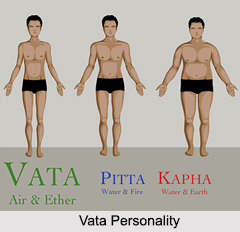 People of Vata Dosha constitution are generally hopeful, sensitive, social and active. Vata Dosha is the first of the Tridosha which is constituted by the elements earth and air. It is responsible for entire body movements and mind activities including blood circulation, respiration, speech, sensation, hearing, touch, excretion, natural urges and formation of foetus, the sexual act, retention and feelings like fear, anxiety, grief and enthusiasm. In short, most of the physical phenomena associated with the nervous system of human beings can be identified with Vata.
People of Vata Dosha constitution are generally hopeful, sensitive, social and active. Vata Dosha is the first of the Tridosha which is constituted by the elements earth and air. It is responsible for entire body movements and mind activities including blood circulation, respiration, speech, sensation, hearing, touch, excretion, natural urges and formation of foetus, the sexual act, retention and feelings like fear, anxiety, grief and enthusiasm. In short, most of the physical phenomena associated with the nervous system of human beings can be identified with Vata.
Physical Features of Vata Personality
Vata personalities are generally physically underdeveloped with flat chests and prominent veins and muscle tendons. The complexion is brown; the skin is cold, rough, dry and cracked. Vata people tend to be either too tall or too short. Physiologically, the appetite and digestion are variable. Vata people love sweet, sour and salty tastes and like hot drinks. The production of urine is scanty and the faeces are dry, hard and small in quantity. They have a tendency to perspire less and also sleep less than other constitutional types.
Psychological Features of Vata Personality
Psychologically, they are characterized by short memory but quick reception and undertaking ability. They have little strength of will, tend towards mental insecurity and possess little tolerance, confidence or boldness. The imbalance of the vata dosha may lead to a wide range of complications like worry anxiety, chronic tiredness, insomnia, underweight, constipation, skin dryness, mental confusion, impulsiveness and fast and disconnected speech.
This article is a stub. You can enrich by adding more information to it. Send your Write Up to content@indianetzone.com




















